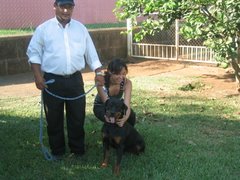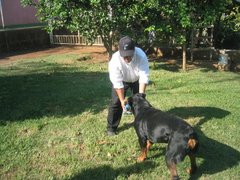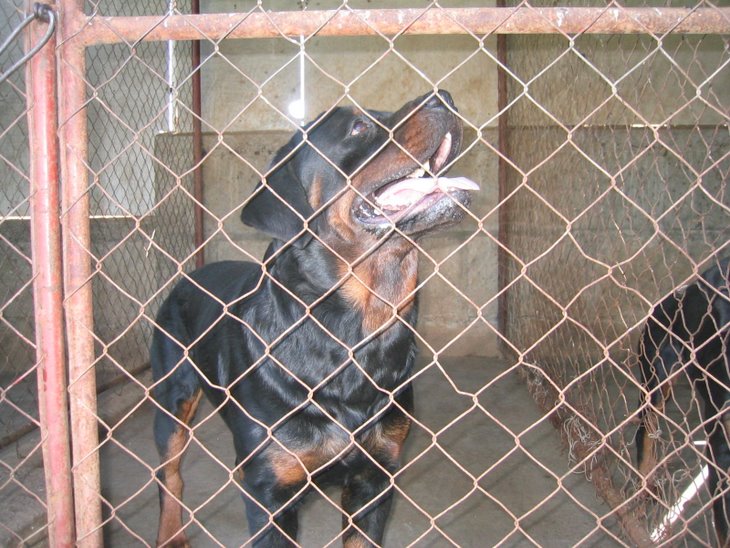Are rottweilers aggressive?
No because when people have direct contact with them, they get used to be around people. By nature his temperament is between phlegmatic and angry. The rottweiler must always have a trainer so that it can be taught the basic course of discipline.
If rottweilers are not naturally aggressive, then why do they become aggressive?
Rottweilers get aggressive when they know that a person is scared, they can smell fear. But all canines do this, not only rottweilers.
Wednesday, April 25, 2007
Rottweiler Info

WITH PROPER training and socializing, the Rottweiler can be a great family pet, companion, herding dog, tracking dog, obedience dog, etc.
They are very loyal, dedicated, loving, beautiful and intelligent.
As a rule they do not bark a lot unnecessarily and they are generally good watch dogs who will let you know when something's up.
With proper training and socializing they will enjoy and participate in nearly any outdoor activity you desire. At the same time, WHEN MATURE, a WELL EXERCISED Rottweiler is a very sedate house dog that wants nothing more than to sleep on the bed or chew on a Nylabone.
 However, they are not perfect and do have their down sides.
However, they are not perfect and do have their down sides.
They are not mature until after 2 years of age and the average life expectancy is only 8 - 10 years.
They are very susceptible to a wide range of cancers and they have a poor immune system (particularly when young) and need a more specialized vaccination schedule as a puppy in order to develop proper immunity.
They are also prone to contracting more viruses than the average dog, especially when fed improperly.
They are susceptible to hip dysplasia, tearing cruciate ligaments and heart problems as well as cancer. They are strong willed and need LOTS of PROPER training and socializing when young. IF you fail in your duties to select, train and socialize them properly, they can be dangerous (sometimes inadvertently) as adults. They are mouthy as puppies until properly taught bite inhibition. Puppies also tend to have temper tantrums. Similar to baby Grizzly bears!
They are very loyal, dedicated, loving, beautiful and intelligent.
As a rule they do not bark a lot unnecessarily and they are generally good watch dogs who will let you know when something's up.
With proper training and socializing they will enjoy and participate in nearly any outdoor activity you desire. At the same time, WHEN MATURE, a WELL EXERCISED Rottweiler is a very sedate house dog that wants nothing more than to sleep on the bed or chew on a Nylabone.
 However, they are not perfect and do have their down sides.
However, they are not perfect and do have their down sides.They are not mature until after 2 years of age and the average life expectancy is only 8 - 10 years.
They are very susceptible to a wide range of cancers and they have a poor immune system (particularly when young) and need a more specialized vaccination schedule as a puppy in order to develop proper immunity.
They are also prone to contracting more viruses than the average dog, especially when fed improperly.
They are susceptible to hip dysplasia, tearing cruciate ligaments and heart problems as well as cancer. They are strong willed and need LOTS of PROPER training and socializing when young. IF you fail in your duties to select, train and socialize them properly, they can be dangerous (sometimes inadvertently) as adults. They are mouthy as puppies until properly taught bite inhibition. Puppies also tend to have temper tantrums. Similar to baby Grizzly bears!

Young dogs require a lot of very good food (poor quality food can cause health problems) SOME young males CAN require as much as 8 - 10 cups of excellent quality food per day, that's 2 - 2 1/2 lbs!
When shedding they leave black "mouse balls" everywhere.
Young dogs require a lot of exercise and need some form of work (obedience, agility, herding, etc). They can be destructive if bored or improperly housed.
They CAN be very dog aggressive especially if not spayed/neutered or if not properly socialized.
They play hard and can easily injure someone unintentionally. They also herd children and other animals and can bump, or nip them while doing so without meaning harm.
It CAN be difficult to obtain homeowner's or renters insurance if you own a Rottweiler.

If you are still interested in owning a Rottweiler, please read some of these excellent books:
The Rottweiler by: Jim Pettengell
The Complete Rottweiler by: Muriel Freeman
Rottweilers by: Les Price
Dr. Ackerman's Book of the Rottweiler
Proper care of Rottweilers by: Joan Klem and Susan Rademacher
Pet Owner's Guide to the Rottweiler by: Mary MacPhail
Grooming
 Keep your dog's toenails short. Long nails can ruin his feet and can also cause joint and lameness probems. Learn how to do them yourself if possible so that you may trim a little of each week. Walking the puppy on pavement or concrete can sometimes help also as can exercise in places where the pup is abe to dig in his feet when running.
Keep your dog's toenails short. Long nails can ruin his feet and can also cause joint and lameness probems. Learn how to do them yourself if possible so that you may trim a little of each week. Walking the puppy on pavement or concrete can sometimes help also as can exercise in places where the pup is abe to dig in his feet when running.Brush your Rottweiler daily or at least once a week with a rubber brush or a fine tooth comb. This will greatly reduce the amount of loose black hair around the house and on clothes. Wipe the ears out with a cottonball dampened with alcohol, peroxide or a commercial ear cleaner once a week. Be sure that your dog has safe chew toys (Nylabones, Hercules, raw beef leg bones) and encourage him to chew daily to help prevent tarter buildup. Bathe no more than twice monthly, unless essential (showing, sprayed by skunk etc) Be sure the dog is dry before allowing him outside in cold weather. Use a good quality dog shampoo. Oatmeal dog shampoos are great for sensitive or flakey skin. Be sure to rinse very thoroughly!
Exercise
 Do not force exercise. Especially in Rottweilers less than 18 months of age. If they are tiring they must stop to rest. Tired muscles (in humans and dogs) become weak and injuries are more likely to occur at that time. Swimming imposes no impact and is not restricted except that tiredness and water intake need to be monitored to prevent cramps and accidental drowning. The puppy should not be asked to pull weights in excess of 5-10 lbs before 14 months of age (and not at all under 7 months) and not in excess of 15-20 lbs before 18 months of age to prevent skeletal stress. He should not carry (in backpacks etc.) more than 2-5% of his body weight or 5 lbs whichever is less, between the ages of 6 to 14 months and should never carry more than 10% of his body weight until beyond 18 months. As an adult he should never carry more than 20% of his weight and that only after training with gradually increasing weight over many week's time, and not on a steady basis.
Do not force exercise. Especially in Rottweilers less than 18 months of age. If they are tiring they must stop to rest. Tired muscles (in humans and dogs) become weak and injuries are more likely to occur at that time. Swimming imposes no impact and is not restricted except that tiredness and water intake need to be monitored to prevent cramps and accidental drowning. The puppy should not be asked to pull weights in excess of 5-10 lbs before 14 months of age (and not at all under 7 months) and not in excess of 15-20 lbs before 18 months of age to prevent skeletal stress. He should not carry (in backpacks etc.) more than 2-5% of his body weight or 5 lbs whichever is less, between the ages of 6 to 14 months and should never carry more than 10% of his body weight until beyond 18 months. As an adult he should never carry more than 20% of his weight and that only after training with gradually increasing weight over many week's time, and not on a steady basis.
Do not let the puppy play on slippery surfaces or with adult dogs as these can cause muscle, joint and growth plate injuries. Try to not allow him to jump up for a treat or a toy; or jump off or over objects that are more than 1' high until beyond 1 year and then only on good footing and with common sense.
DO allow the puppy to run and play on safe footing as much as he wants of his own free will. Be sure he is in a safely enclosed area when playing off a leash.
Subscribe to:
Posts (Atom)








